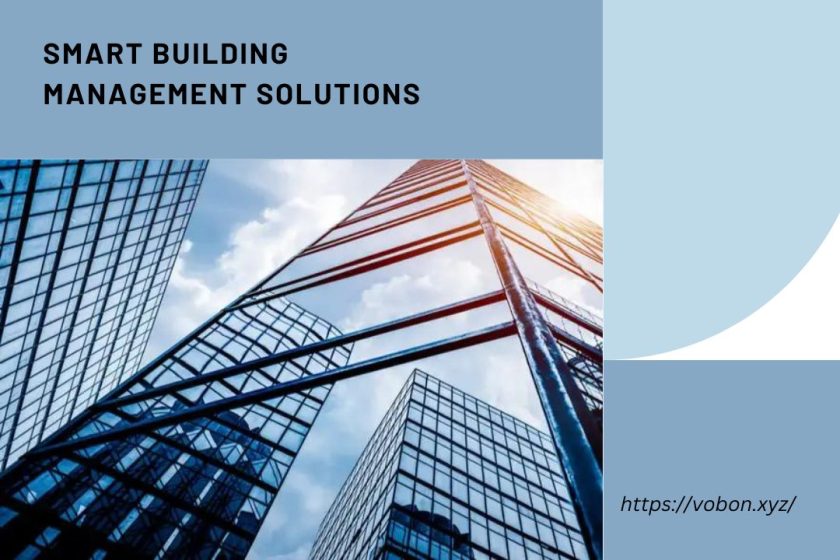In today’s rapidly evolving world, buildings are no longer just structures that provide shelter. They have become intelligent and interconnected entities, capable of optimizing energy consumption, ensuring security, and enhancing occupant comfort. These advancements are made possible through smart building management solutions, which leverage technology to revolutionize the way we interact with our built environment. In this article, we will explore the concept of smart building management solutions, their benefits, key features, real-life examples, challenges in implementation, future trends, and more.
Introduction
The advent of smart building management solutions has paved the way for a new era of intelligent buildings. These solutions combine advanced technologies such as the Internet of Things (IoT), artificial intelligence, and data analytics to optimize various aspects of building operations. From energy management and security to space utilization and occupant comfort, smart building management solutions have the potential to transform the way buildings are managed and operated.
What Are Smart Building Management Solutions?
Smart building management solutions encompass a range of technologies, systems, and processes designed to streamline and automate building operations. They integrate disparate systems within a building, enabling seamless communication and control. By gathering real-time data from sensors and devices, these solutions provide actionable insights that empower building owners and managers to make informed decisions and optimize resource utilization.
Benefits of Smart Building Management Solutions
Energy Efficiency and Cost Savings
One of the significant advantages of smart building management solutions is their ability to improve energy efficiency and reduce operational costs. By leveraging data analytics and automation, these solutions enable proactive energy management, identifying areas of energy waste and optimizing consumption. Smart lighting systems, for example, can adjust illumination levels based on occupancy and daylight availability, leading to substantial energy savings.
Improved Security and Safety
Smart building management solutions enhance the security and safety of occupants and assets within a building. Integrated security systems, including access control, video surveillance, and alarm systems, provide comprehensive protection against unauthorized access and potential threats. Real-time monitoring and alerts enable swift responses to incidents, ensuring a safer environment for occupants.
Enhanced Occupant Comfort and Productivity
Smart building management solutions prioritize occupant comfort and productivity. Intelligent HVAC systems regulate temperature and ventilation based on occupancy patterns and environmental conditions, creating an optimal indoor environment. Additionally, smart space management solutions help optimize workspace allocation, improve collaboration, and enhance productivity.
Key Features of Smart Building Management Solutions
To achieve their objectives, smart building management solutions incorporate several key features and technologies. Let’s explore some of them:
Building Automation Systems
Building automation systems form the backbone of smart building management solutions. They enable centralized control and monitoring of various building systems, including lighting, HVAC, security, and more. Through a unified interface, building operators can manage and optimize these systems, resulting in improved efficiency and operational effectiveness.
Energy Management Systems
Energy management systems are integral to smart building solutions, providing insights into energy consumption patterns and facilitating energy optimization strategies. These systems monitor and analyze data from energy meters, sensors, and other sources to identify energy-saving opportunities and drive sustainability initiatives.
Security and Access Control Systems
Smart building management solutions prioritize security and access control. These systems combine technologies such as biometric identification, smart card readers, and video surveillance to manage building access and detect potential security breaches. Integration with other building systems allows for automated responses to security events.
Integrated Communication and Collaboration Systems
Collaboration is a vital aspect of modern buildings, and smart building management solutions support seamless communication and collaboration. Integrated audiovisual systems, video conferencing, and digital signage enable effective communication and foster collaboration among building occupants.
Data Analytics and Predictive Maintenance
Data analytics and predictive maintenance play a crucial role in optimizing building operations. By analyzing real-time and historical data, these solutions identify maintenance needs, detect equipment failures, and predict potential issues. This proactive approach minimizes downtime, reduces maintenance costs, and enhances overall building performance.
Case Studies: Real-Life Examples of Smart Building Management Solutions
To illustrate the practical applications of smart building management solutions, let’s explore a few real-life case studies:
Smart Lighting and Energy Optimization
In a commercial office building, smart lighting solutions were implemented to reduce energy consumption. By utilizing occupancy sensors and daylight harvesting technology, the lighting system adjusted illumination levels based on occupancy and natural light availability. This led to significant energy savings while maintaining optimal lighting conditions for occupants.
Intelligent HVAC Systems
An educational institution integrated an intelligent HVAC system into its buildings to enhance occupant comfort and reduce energy waste. The system analyzed temperature, humidity, and occupancy data to dynamically adjust HVAC settings. As a result, the institution achieved substantial energy savings while ensuring a comfortable learning environment for students and staff.
Occupancy and Space Management
A large co-working space provider deployed smart building management solutions to optimize space utilization. Through occupancy sensors and real-time data analysis, the system identified underutilized areas, enabling efficient allocation of workspace. This not only maximized occupancy rates but also improved collaboration and flexibility among tenants.
Challenges in Implementing Smart Building Management Solutions
While smart building management solutions offer numerous benefits, their implementation can pose certain challenges. It is essential to address these challenges to ensure successful adoption. Some common challenges include:
Integration and Interoperability
Integrating disparate building systems from different vendors can be complex. The lack of standardization and interoperability protocols often poses challenges in creating a unified ecosystem of smart technologies. It requires careful planning and collaboration among stakeholders to overcome these integration hurdles.
Cybersecurity Concerns
As buildings become more interconnected, the risk of cyber threats increases. Smart building management solutions need robust cybersecurity measures to safeguard sensitive data and prevent unauthorized access. Implementing encryption, authentication protocols, and continuous monitoring are critical to maintaining a secure environment.
Cost and Return on Investment
The initial investment required for implementing smart building management solutions can be substantial. Building owners and operators must carefully evaluate the potential return on investment (ROI) and long-term cost savings associated with these solutions. A comprehensive cost-benefit analysis considering energy savings, operational efficiency, and tenant satisfaction is crucial in making informed decisions.
Future Trends in Smart Building Management Solutions
As technology continues to evolve, the future of smart building management solutions looks promising. Some emerging trends to watch out for include:
Artificial Intelligence and Machine Learning
Artificial intelligence (AI) and machine learning (ML) algorithms will play a vital role in optimizing building operations. These technologies can analyze vast amounts of data, identify patterns, and generate actionable insights. AI-powered predictive analytics will enable more accurate energy forecasting, predictive maintenance, and occupant behaviour analysis.
Internet of Things (IoT) Integration
The Internet of Things (IoT) will further enhance the connectivity and capabilities of smart building management solutions. IoT sensors, actuators, and devices will seamlessly communicate and exchange data, enabling real-time monitoring, control, and automation. This integration will lead to more efficient resource management, improved occupant experiences, and intelligent decision-making.
Sustainability and Green Building Initiatives
Sustainability will remain a significant focus in the future of smart buildings. Building management solutions will continue to prioritize energy efficiency, renewable energy integration, and environmental sustainability. Green building certifications and standards will drive the adoption of sustainable practices, making smart buildings more eco-friendly and socially responsible.
Conclusion
Smart building management solutions are revolutionizing the way buildings are managed, operated, and experienced. By leveraging advanced technologies and data-driven insights, these solutions optimize energy consumption, enhance security, and improve occupant comfort and productivity. Despite implementation challenges, the future looks promising, with AI, IoT integration, and sustainability initiatives driving further advancements. Embracing smart building management solutions will not only lead to cost savings and operational efficiencies but also create sustainable and future-ready built environments.
FAQs
What are the advantages of smart building management solutions?
Smart building management solutions offer benefits such as improved energy efficiency, enhanced security, and increased occupant comfort and productivity. They optimize building operations and reduce operational costs.
How can smart building management solutions improve energy efficiency?
By utilizing real-time data analytics, automation, and optimization algorithms, smart building management solutions identify energy waste and implement energy-saving measures. They regulate lighting, HVAC, and other systems based on occupancy and environmental conditions, leading to significant energy savings.
Are smart building management solutions suitable for both residential and commercial buildings?
Yes, smart building management solutions can be implemented in both residential and commercial buildings. They can be tailored to the specific needs and requirements of different types of buildings, optimizing energy consumption, security, and comfort accordingly.
How do smart building management solutions enhance security and safety?
Integrated security systems, access control, video surveillance, and alarm systems are key components of smart building management solutions. They provide comprehensive security measures, enabling proactive threat detection, real-time monitoring, and swift response to incidents, thereby enhancing the safety of occupants and assets.
What are the potential cost savings associated with implementing smart building management solutions?
Implementing smart building management solutions can result in significant cost savings. These include reduced energy consumption, optimized maintenance schedules, enhanced operational efficiency, and improved tenant satisfaction. The exact cost savings depend on factors such as building size, usage patterns, and the scope of implemented solutions.





